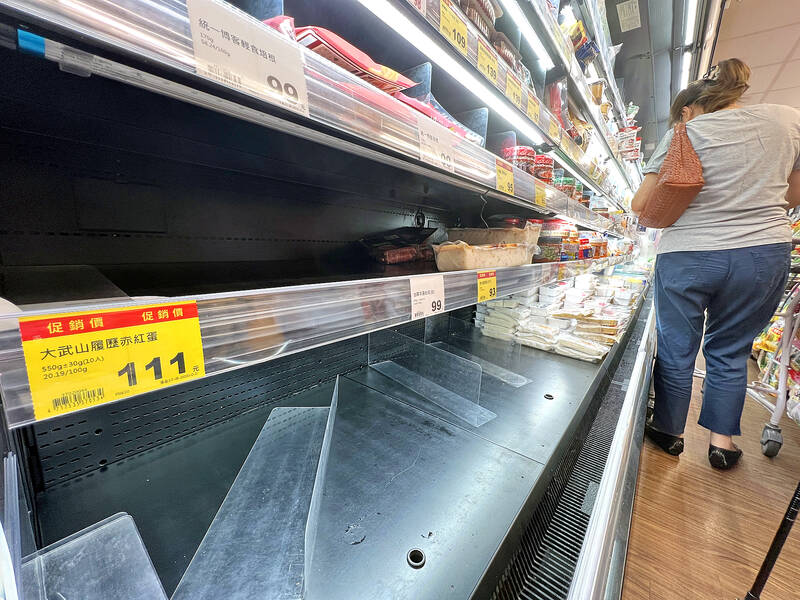Taiwan can only have an adequate domestic egg supply if egg production is increased by 4 percentage points, the Ministry of Agriculture said yesterday.
Demand is 24 million eggs per day, but only 22.9 million eggs are produced per day in Taiwan, the ministry said.
However, the government cannot accurately estimate domestic egg-production rates because not all farms have modern operations, the Department of Animal Industry said.

Photo: CNA
The nation has about 33.59 million hens, with 85 percent of farms using traditional methods, the department said.
Many of these chicken farm owners keep old and young hens together, with the older hens accounting for as much as 30 percent of the flock, it said.
The egg-producing rate of such flocks is estimated to be 68 percent, it said.
If the egg-producing rate could be raised to 72 percent, it would mean 1.32 million more eggs per day, meeting daily demand, it said.
The department said that it has proposed two solutions to boost the egg-producing rate:
First, the department is to incentivize the industry to retire old hens by supplying chicks.
However, farm owners are usually not willing to retire older hens when egg prices are high, it said.
An average of 1 million hens were retired per month in 2021, but the number fell to 900,000 per month last month, it said.
When egg prices were high in April, only 400,000 hens were retired, it said.
With the avian flu season to start soon, there is no way to determine when the percentage of old hens could be reduced, the department said.
Second, the department has budgeted NT$1.05 billion (US$32.92 million) to help modernize chicken farms across Taiwan from this year to 2025, it said.
So far, it has received 200 applications to join its modernization program, it said.
Separately, Minister of Agriculture Chen Chi-chung (陳吉仲) said that the government has imported eggs based on World Organisation for Animal Health regulations.
The Chinese Nationalist Party (KMT) earlier yesterday accused the ministry of allowing Ultra Source Ltd to import eggs from Brazil in June and July, despite on June 28 declaring that the nation was a source of avian flu infection.
Opposition lawmakers are spreading “unsubstantiated rumors” about eggs imported from Brazil, Chen said.
“We have also imported eggs from Japan and the US, both of which are affected by avian flu, because the regulations state that eggs must be imported from farms that have not had avian flu cases for 28 days,” Chen said.
The ministry has followed international regulations for quality control of eggs imported from the US, Japan, Australia, Brazil, Turkey, Thailand and the Philippines, Chen said, adding that the eggs imported from Brazil were from avian flu-free farms.
The government would keep importing eggs until June next year, or until egg production capacity fully recovers or there is a substantial improvement in farming methods, he said.
Ultra Source said in a statement that the last batch of eggs it ordered from Brazil left the South American country at the end of May, before its first avian flu case was reported on June 27.

An essay competition jointly organized by a local writing society and a publisher affiliated with the Chinese Communist Party (CCP) might have contravened the Act Governing Relations Between the People of the Taiwan Area and the Mainland Area (臺灣地區與大陸地區人民關係條例), the Mainland Affairs Council (MAC) said on Thursday. “In this case, the partner organization is clearly an agency under the CCP’s Fujian Provincial Committee,” MAC Deputy Minister and spokesperson Liang Wen-chieh (梁文傑) said at a news briefing in Taipei. “It also involves bringing Taiwanese students to China with all-expenses-paid arrangements to attend award ceremonies and camps,” Liang said. Those two “characteristics” are typically sufficient

A magnitude 5.9 earthquake that struck about 33km off the coast of Hualien City was the "main shock" in a series of quakes in the area, with aftershocks expected over the next three days, the Central Weather Administration (CWA) said yesterday. Prior to the magnitude 5.9 quake shaking most of Taiwan at 6:53pm yesterday, six other earthquakes stronger than a magnitude of 4, starting with a magnitude 5.5 quake at 6:09pm, occurred in the area. CWA Seismological Center Director Wu Chien-fu (吳健富) confirmed that the quakes were all part of the same series and that the magnitude 5.5 temblor was

The brilliant blue waters, thick foliage and bucolic atmosphere on this seemingly idyllic archipelago deep in the Pacific Ocean belie the key role it now plays in a titanic geopolitical struggle. Palau is again on the front line as China, and the US and its allies prepare their forces in an intensifying contest for control over the Asia-Pacific region. The democratic nation of just 17,000 people hosts US-controlled airstrips and soon-to-be-completed radar installations that the US military describes as “critical” to monitoring vast swathes of water and airspace. It is also a key piece of the second island chain, a string of

The Central Weather Administration has issued a heat alert for southeastern Taiwan, warning of temperatures as high as 36°C today, while alerting some coastal areas of strong winds later in the day. Kaohsiung’s Neimen District (內門) and Pingtung County’s Neipu Township (內埔) are under an orange heat alert, which warns of temperatures as high as 36°C for three consecutive days, the CWA said, citing southwest winds. The heat would also extend to Tainan’s Nansi (楠西) and Yujing (玉井) districts, as well as Pingtung’s Gaoshu (高樹), Yanpu (鹽埔) and Majia (瑪家) townships, it said, forecasting highs of up to 36°C in those areas